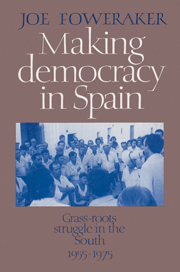Book contents
- Frontmatter
- Contents
- Preface
- Introduction: personal networks, political strategies and the making of democracy
- PART I PERSONAL NETWORKS, POLITICAL TRADITIONS AND STATE POLICIES
- PART II SYNDICAL PRACTICES, SOCIAL STRUGGLES AND POLITICAL PROTESTS
- PART III POLITICAL PRACTICES, REPRESSION AND STRATEGIC RESPONSES
- PART IV POLITICAL STRATEGIES AND THE DEMOCRATIC PROJECT
- 13 Democratic transformation and the transition to democracy: the political project of the labour movement, 1955–1985
- 14 Corporatist strategies and the transition to democracy: the institutional terrain of the struggle
- 15 Personal networks and political strategies: Spanish civil society in the struggle for democracy
- Bibliography
- Index
13 - Democratic transformation and the transition to democracy: the political project of the labour movement, 1955–1985
Published online by Cambridge University Press: 29 September 2009
- Frontmatter
- Contents
- Preface
- Introduction: personal networks, political strategies and the making of democracy
- PART I PERSONAL NETWORKS, POLITICAL TRADITIONS AND STATE POLICIES
- PART II SYNDICAL PRACTICES, SOCIAL STRUGGLES AND POLITICAL PROTESTS
- PART III POLITICAL PRACTICES, REPRESSION AND STRATEGIC RESPONSES
- PART IV POLITICAL STRATEGIES AND THE DEMOCRATIC PROJECT
- 13 Democratic transformation and the transition to democracy: the political project of the labour movement, 1955–1985
- 14 Corporatist strategies and the transition to democracy: the institutional terrain of the struggle
- 15 Personal networks and political strategies: Spanish civil society in the struggle for democracy
- Bibliography
- Index
Summary
The regime was no longer able to attack in such blind and brutal fashion as before, but retreated from the advancing masses, pretending to negotiate with strikers and workers at the same time as it deployed its repressive forces to disband their organizations. In short, it now attacked not frontally but from the flanks, in an attempt to preserve or rather recover its hegemony.
José Biescas, España bajo la Dictadura FranquistaMany recent accounts of the transition to democracy in Spain have seen it as beginning with Franco's death. But this story shows that history is not quite this simple. What began in late 1975 was the relatively rapid abrogation of Francoist laws and the construction of a new legality which sealed the final phase of the democratic transformation of the Francoist State; but the transformation itself began much earlier with the slow stirring of the Spanish people and the progressive emergence of new forms of political organization which finally achieved a radical change in the balance of forces in Spanish civil society. The transition cannot be understood, therefore, without taking into account this process of transformation; and the key political question is not so much the merely tactical one of how so much political compromise could have been achieved in so little time, as the strategic one of how such extensive organization could take place despite the severe restrictions imposed by one of the most repressive of modern dictatorships.
- Type
- Chapter
- Information
- Making Democracy in SpainGrass-Roots Struggle in the South, 1955–1975, pp. 215 - 229Publisher: Cambridge University PressPrint publication year: 1989



